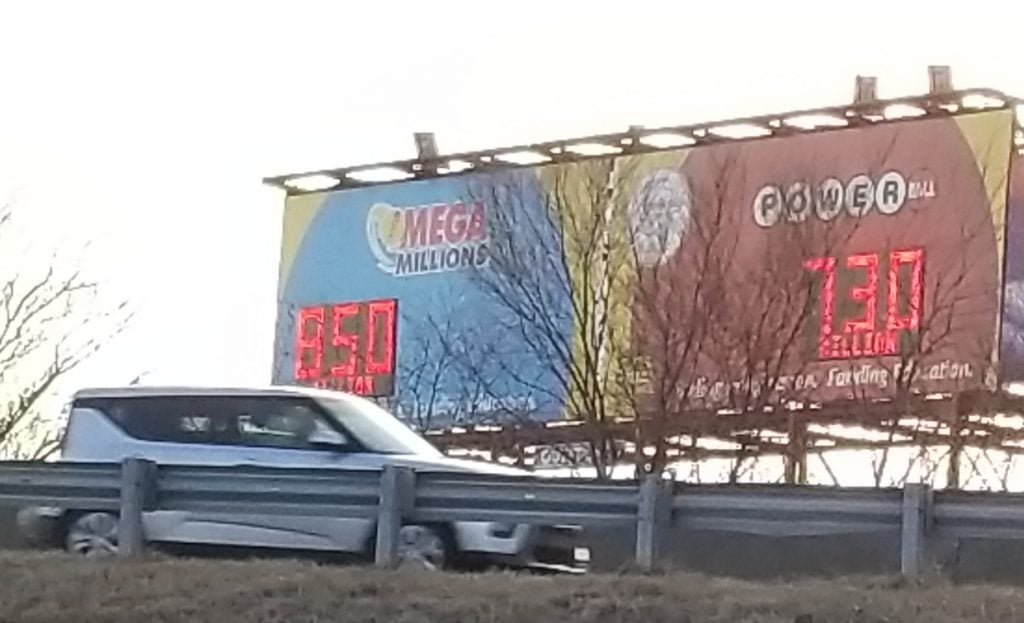More Than COVID Keeping Mega Millions and Powerball Jackpots From Getting Bigger
Posted on: January 18, 2021, 10:22h.
Last updated on: January 19, 2021, 09:18h.
On Wednesday, Powerball holds its 36th drawing since the multi-state lottery produced a jackpot winner. That four-month span, according to the Multi-State Lottery Association that operates the game, represents its longest dry spell ever.

Yet, while Wednesday’s estimated $730 million jackpot is still massive – it’s the fourth-largest in the game’s history – it’s taken some time to build. The same holds true with the other multi-state lottery game, Mega Millions. It, too, has not gone out since mid-September. But the Tuesday jackpot is worth $850 million.
For comparison purposes, the largest jackpots both games have awarded each surpassed $1.5 billion. However, Powerball’s nearly $1.59 billion took just 10 weeks to build, while Mega Millions needed only three months for its $1.54 billion grand prize.
Both games use ticket sales projections to estimate jackpot values in advance. With the odds of winning massive – 1 in 292.2 million for Powerball, 1 in 302.6 million for Mega Millions – lower ticket sales also means it increases the chances the winning combination won’t get picked.
As you may expect, COVID-19 has had an impact on those sales. However, industry analysts and officials tell Casino.org there are other reasons for the slow build.
Simultaneous Big Jackpots an Issue
This is not the first time both lotteries have had large jackpots. Mega Millions gave out its record jackpot $1.54 billion prize on Oct. 23, 2018. Just four days later, two Powerball players split a $687.8 million prize, then the third-largest in that game’s history.
And earlier that year, a $451 million Mega Millions prize went out on Jan. 5. At that time, it was the game’s fourth-largest prize. The very next day, a $559.7 Powerball prize was claimed. That, at the time, was Powerball’s third-largest prize ever.
Gerry Aubin, a senior lottery advisor for Spectrum Gaming Group, told Casino.org that when one lottery pool gets big, bettors flock to that and it grows faster. But that’s harder to do when both haven’t been claimed.
“Maybe they’ll split the wagers, but there’s only so much money to go around,” he said.
Powerball, Mega Millions No Longer Headline News
Another issue hurting the lotteries has been a lack of coverage.
Aubin, who previously served as the director of the Rhode Island Lottery for more than 24 years, said there’s a cadre of casual players who will not play the lottery until the news starts covering it. That coverage has picked up in the past week or so, he said, but it’s still not as big a story as it would’ve been in the past.
He’s not alone in that line of thinking. Jeff Lenard, vice president of strategic industry initiatives for the convenience store industry trade group NACS, told Casino.org that many TV news viewers aren’t catching the lottery story.
“They are not seeing stories on the news like in more normal times because it has been crowded out by other news,” he said. “These jackpots would be a top – or the top – news story most times, but has been reduced to an ‘in other news tonight’ story, if that.”

How Can Lotteries Revive Appeal
Aubin recalled a time shortly after he started at the Rhode Island lottery and the Powerball grew to more than $100 million. Massachusetts then was not a part of the game’s network, so plenty of people drove down Interstate 95 and other roads to get their tickets.
Lines were as long as a football field in some places near the state line, he recalled. The same thing happened in Connecticut with New Yorkers driving across the state line, too.
The only way he sees those lines possibly coming back is if a jackpot approaches the record amount.
It was just such a novelty, and people wanted to become part of that cult-like mentality of buying a Powerball or Mega Millions ticket,” Aubin told Casino.org. “So that has gone away. It doesn’t have the cachet it had.”
He noted that people with both games are trying to find solutions to create more interest and bigger jackpots. One possible suggestion is international expansion. However, he compared getting changes approved to an act of Congress. With all but five states involved in the games, it can create challenges to get consensus.
Except for Nevada, every other state that has approved sports betting is also a part of the multi-state lottery games. Aubin said he does not see that as competition, since that appeals to a younger generation.
But there are ways lotteries and retailers can appeal to that demographic, he said. That includes more lotteries allowing online sales. Retailers also need to embrace the use of debit and credit cards. Most convenience stores, he said, do not allow card payments because of the fees associated with them.
“It’s a big obstacle to try to get young people who don’t even know what a dollar bill looks like to then actually, physically go into a convenience store and make that purchase,” Aubin told Casino.org.
COVID Causing Several Issues
All the above are formidable challenges for lottery games to overcome. Add in a pandemic with business closures, as well as social distancing requirements, and it becomes that much harder.
Just saying COVID-19 is an issue, though, doesn’t really give a sense for how it’s impacted sales.
Lenard noted fewer people are commuting to work. That reduces the chances they get to see billboards and subway signs touting jackpots. Another downside from the work-from-home climate, Aubin said, is that fewer people are getting up office pools to buy bundles of tickets.
Another is that while convenience stores sales “are holding their own,” Lenard said shoppers are making fewer visits. The data also indicates people are buying fewer impulse items as purchases have shifted to more bulk items.
“Finally, these are very difficult times for a substantial percentage of the population,” Lenard told Casino.org. “For those who are carefully watching their budgets, the lottery may not fit into their current spending patterns. All of this, plus concerns over lines and crowds related to the pandemic, are likely causes of the slowness in sales.”
Related News Articles
Top Chinese Lottery Officials Paraded After Possible $20 Billion Embezzlement
Lottery Winner’s Boyfriend Throws Tantrum Because She Won’t Buy Him a Tesla
Most Popular
Mirage Las Vegas Demolition to Start Next Week, Atrium a Goner
Where All the Mirage Relics Will Go
Most Commented
-
Bally’s Facing Five Months of Daily Demolition for Chicago Casino
— June 18, 2024 — 12 Comments -
Chicago Pension Mess Highlights Need for Bally’s Casino
— July 2, 2024 — 5 Comments
















No comments yet